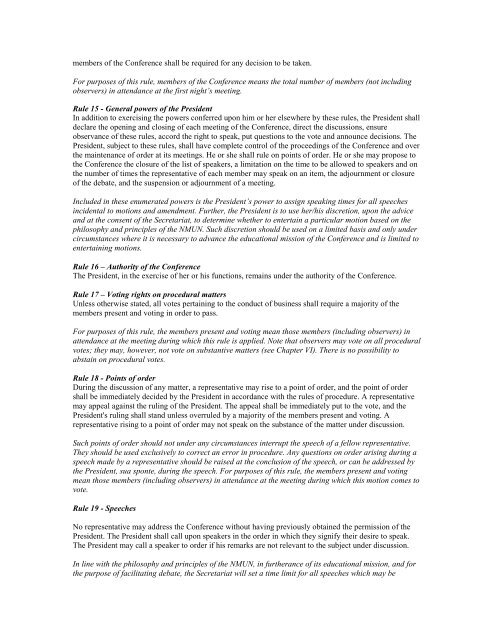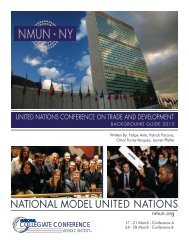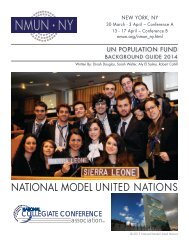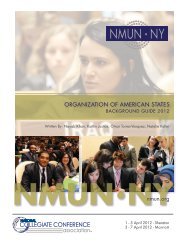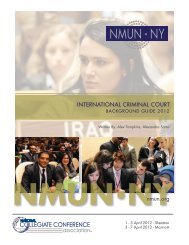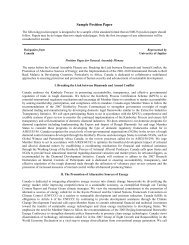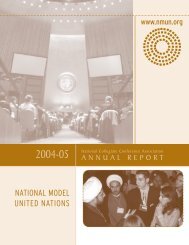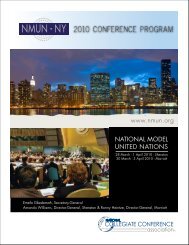NMUN • KOREA - National Model United Nations
NMUN • KOREA - National Model United Nations
NMUN • KOREA - National Model United Nations
Create successful ePaper yourself
Turn your PDF publications into a flip-book with our unique Google optimized e-Paper software.
members of the Conference shall be required for any decision to be taken.<br />
For purposes of this rule, members of the Conference means the total number of members (not including<br />
observers) in attendance at the first night’s meeting.<br />
Rule 15 - General powers of the President<br />
In addition to exercising the powers conferred upon him or her elsewhere by these rules, the President shall<br />
declare the opening and closing of each meeting of the Conference, direct the discussions, ensure<br />
observance of these rules, accord the right to speak, put questions to the vote and announce decisions. The<br />
President, subject to these rules, shall have complete control of the proceedings of the Conference and over<br />
the maintenance of order at its meetings. He or she shall rule on points of order. He or she may propose to<br />
the Conference the closure of the list of speakers, a limitation on the time to be allowed to speakers and on<br />
the number of times the representative of each member may speak on an item, the adjournment or closure<br />
of the debate, and the suspension or adjournment of a meeting.<br />
Included in these enumerated powers is the President’s power to assign speaking times for all speeches<br />
incidental to motions and amendment. Further, the President is to use her/his discretion, upon the advice<br />
and at the consent of the Secretariat, to determine whether to entertain a particular motion based on the<br />
philosophy and principles of the <strong>NMUN</strong>. Such discretion should be used on a limited basis and only under<br />
circumstances where it is necessary to advance the educational mission of the Conference and is limited to<br />
entertaining motions.<br />
Rule 16 – Authority of the Conference<br />
The President, in the exercise of her or his functions, remains under the authority of the Conference.<br />
Rule 17 – Voting rights on procedural matters<br />
Unless otherwise stated, all votes pertaining to the conduct of business shall require a majority of the<br />
members present and voting in order to pass.<br />
For purposes of this rule, the members present and voting mean those members (including observers) in<br />
attendance at the meeting during which this rule is applied. Note that observers may vote on all procedural<br />
votes; they may, however, not vote on substantive matters (see Chapter VI). There is no possibility to<br />
abstain on procedural votes.<br />
Rule 18 - Points of order<br />
During the discussion of any matter, a representative may rise to a point of order, and the point of order<br />
shall be immediately decided by the President in accordance with the rules of procedure. A representative<br />
may appeal against the ruling of the President. The appeal shall be immediately put to the vote, and the<br />
President's ruling shall stand unless overruled by a majority of the members present and voting. A<br />
representative rising to a point of order may not speak on the substance of the matter under discussion.<br />
Such points of order should not under any circumstances interrupt the speech of a fellow representative.<br />
They should be used exclusively to correct an error in procedure. Any questions on order arising during a<br />
speech made by a representative should be raised at the conclusion of the speech, or can be addressed by<br />
the President, sua sponte, during the speech. For purposes of this rule, the members present and voting<br />
mean those members (including observers) in attendance at the meeting during which this motion comes to<br />
vote.<br />
Rule 19 - Speeches<br />
No representative may address the Conference without having previously obtained the permission of the<br />
President. The President shall call upon speakers in the order in which they signify their desire to speak.<br />
The President may call a speaker to order if his remarks are not relevant to the subject under discussion.<br />
In line with the philosophy and principles of the <strong>NMUN</strong>, in furtherance of its educational mission, and for<br />
the purpose of facilitating debate, the Secretariat will set a time limit for all speeches which may be


